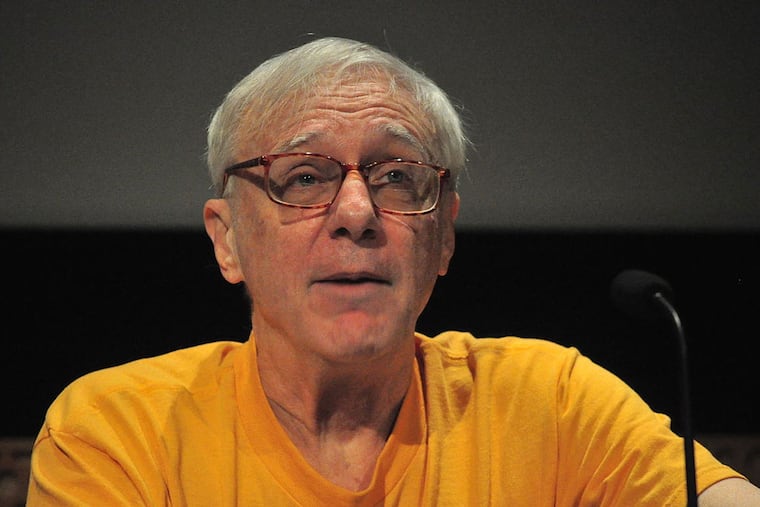Christgau, 'dean of American rock critics,' looks back
Going into the City is the memoir by longtime Village Voice music critic and editor Robert Christgau, known as the "dean of American rock critics." It could really use something:

Going into the City
Portrait of a Critic as a Young Man
By Robert Christgau
Dey Street. 367 pp. $34.99
nolead ends nolead begins
Reviewed by Dan DeLuca
Going into the City is the memoir by longtime Village Voice music critic and editor Robert Christgau, known as the "dean of American rock critics." It could really use something:
A companion volume.
Or maybe just lots of hyperlinks. Some way, in any case, to give the reader the opportunity to read all the writing, by himself and others, that Christgau writes about in this lively chronicle of his own personal and intellectual history and the history of rock criticism itself
It would include "Dylan" by Ellen Willis, the insightful 1967 piece about image and celebrity first published in Commentary that led Christgau's then-girlfriend to become the New Yorker's first rock critic.
There would also be Christgau's own "Beth Ann and Macrobioticism," the 1965 "tersely Hemingwayesque" article for the New York Herald Tribune about a young woman who starved herself to death. The piece gave Christgau, then an acolyte of Tom Wolfe's, his reputation as a young comer.
The collection would have to feature Christgau's "We Have to Deal With It," an 8,000-word report on British punk published in 1977. Christgau can't help congratulating himself on it, suggesting it was responsible for breaking the Clash to an American audience.
And that extra volume would make room for writers Christgau admires, such as the modernist social critic Marshall Berman, author of All That Is Solid Melts into Air, not to mention fellow critical luminaries such as James Wolcott, Lester Bangs, Greg Tate, and, of course, Mystery Train author Greil Marcus, his rare equal as a rock-crit heavyweight.
And of course, it would include many examples of the Consumer Guide, the authoritative platform through which, starting in 1969, Christgau, now 73, has reviewed upward of 14,000 albums in meaty, one-paragraph quick hits with letter grades. That form, which Entertainment Weekly and many other outlets adopted, proved highly durable over the course of Christgau's tenure as the "dean" (a title which, by his account, dates back to a 5th Dimension promo event in 1970 at which someone first called him that).
For Christgau, the Queens-born, Dartmouth-educated son of a firefighter, Going into the City's title refers to the geographical and cultural trek into Manhattan, first in his teenage 1950s, when he would head to Times Square in pursuit of bargain deals on jukebox 45s. Later, it means going downtown, to a lower Manhattan of the mind, and "committing to the emergent bohemia of my coming of age."
The memoir, which comes to a close in 1985, does contain plenty of fresh critical writing along with frequent assessments of his own work over the years. Mostly, the dean concludes that he done good, though he does cop to a few embarrassing errors, such as when he called Jimi Hendrix a "psychedelic Uncle Tom." He also is compelled to admit that the Voice was too slow to hire black writers to write about black music.
He focuses on his favorite recordings (Bill Doggett's "Honky Tonk," or the 1973 compilation album Africa Dances), and most cherished in-concert experiences. In the early 1960s, he saw John Coltrane at the Village Gate in New York, "trading laps with Eric Dolphy in an encore that had me . . . pretty much out of my head. That's still the most ecstatic musical experience in a life rich with them."
He revisits Television's 1977 album Marquee Moon, which he praises as an examination of youth that voices "a multivalence worthy of that adventure's complexity and confusion - beautifully, profoundly, naively, contradictorily, romantically, kinetically, jokily, cockily, fearfully, drunkenly, goofily, impudently - so nervous and excited you could fly, or is it faint?"
Much of the criticism in this book, however, is not about music. Christgau also wants you to know he cares deeply about books and movies. His exegesis of Dostoyevsky's Crime and Punishment - a teenage obsession he re-reread in 2008 - is smartly argued and crucially illuminating on the way he views the world. His lengthy deep dives into Theodore Dreiser's Sister Carrie and Christina Stead's The Man Who Loved Children are less enthralling.
Many Christgau devotees favor the pithy Consumer Guide over his denser longer pieces. And Going into the City suffers from informational overload on several fronts.
It's a well-remembered and reported book, and we get names and vignettes of many incidental characters, from schoolboy crushes to journalistic peers. This self-described feminist and "anti-bohemian bohemian" also shares way more than we need to know about his sexual experiences, and in particular divulges more about the late Willis' appetites than is seemly.
His IQ is 139, we now know, and we're also made aware of the momentous moment Carola Dibbell, his wife since 1974, first "understood how smart I was."
Christgau tends to look back at all he's done and gives himself an A-minus, at least. A not-atypical transition is, "through this brouhaha with more to come, I kept doing what I'd been doing, only better."
Show us how you did that, Dean, don't tell us.
215-854-5628
@delucadan